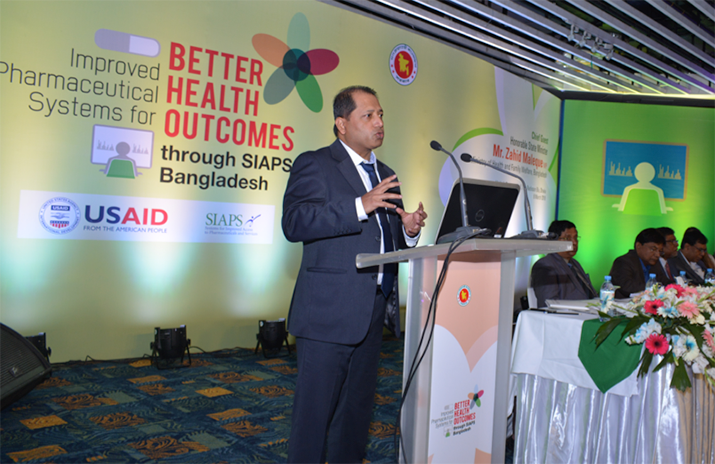SIAPS Concludes Work in Bangladesh
SIAPS Concludes Work in Bangladesh

Since September 2011, SIAPS has partnered with Bangladesh’s Ministry of Health and Family Welfare (MOHFW) and its key Directorates, including the Directorate General of Family Planning (DGFP); the Directorate General of Health Services (DGHS), the Directorate General of Drug Administration; and the National Tuberculosis Control Program, to address barriers to access to essential health commodities and strengthen the ability of policy makers, health care providers, and institutions to improve commodity management and ensure the continuous availability of commodities.
To mark the conclusion of SIAPS’ work in Bangladesh, an event on March 8, 2018, at the Radisson Blu in Dhaka celebrated the program’s achievements in pharmaceutical systems strengthening, shared lessons learned to build resilient pharmaceutical systems, and discussed the way forward. Mr. Zahid Maleque, MP, Honorable State Minister of Health and Family Welfare, chaired the event. Guests included Prof. Dr. Abul Kalam Azad, the Director General of Health Services; Mr. Kazi Mustafa Sarwar, the Director General of Family Planning; Mr. Golam Kibria, representing the Director General of Drug Administration; Mr. Humayun Kabir, the former Senior Secretary to the MOHFW; and Ms. Ariella Camera, the USAID Deputy Director in the Office of Population, Health, Nutrition, and Education (OPHNE).
Mr. Francis Aboagye-Nyame, SIAPS Program Director, welcomed attendees, and Mr. Zahedul Islam, Country Project Director, delivered the keynote presentation. Mr. Islam highlighted the achievements, best practices, lessons learned, and the way forward after the end of the project.
Key accomplishments in the country have included a significant increase in the availability of family planning; maternal, newborn, and child health; and TB commodities at the national and district levels. At the national level, the country has been able to suppress stock-outs of contraceptives since 2011. SIAPS supported the establishment of different coordination bodies, such as the Procurement and Logistics Management Cell in the MOHFW, and key directorates to oversee and coordinate procurement and supply management functions to improve efficiency and transparency.
The Honorable State Minister acknowledged SIAPS’ efforts in building the capacity of MOHFW staff to strengthen pharmaceutical systems in the country. He thanked USAID for its cooperation and funding and urged the agency to continue its support.
With USAID funding, SIAPS introduced health information system tools, such as the electronic logistics management information system (eLMIS) to help the DGFP track family planning commodities at more than 29,000 service delivery points, and another eLMIS to support the DGHS in tracking 25 lifesaving commodities in 14 districts.
SIAPS also developed an Asset Management System for public health facilities that covers registration to decommissioning and supported the launch of Pharmadex, a tool for online medicine registration. All of these tools are producing essential data to facilitate evidence-based decision making.
Mr. Islam observed that “Capacity building was one of the key elements of SIAPS. We undertook different approaches that included developing master trainers to train on different SIAPS-developed systems.” SIAPS supported the training of more than 22,000 health workers in different pharmaceutical management areas.